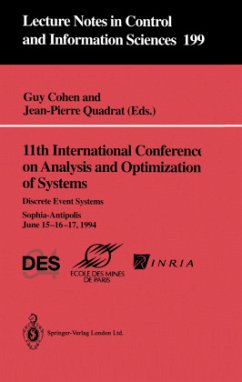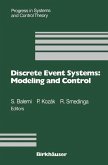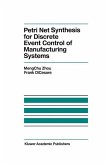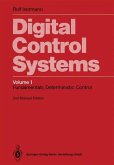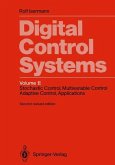11th International Conference on Analysis and Optimization of Systems: Discrete Event Systems
Sophia-Antipolis, June 15-16-17, 1994
Herausgegeben:Cohen, Guy; Quadrat, Jean-Pierre
11th International Conference on Analysis and Optimization of Systems: Discrete Event Systems
Sophia-Antipolis, June 15-16-17, 1994
Herausgegeben:Cohen, Guy; Quadrat, Jean-Pierre
- Broschiertes Buch
- Merkliste
- Auf die Merkliste
- Bewerten Bewerten
- Teilen
- Produkt teilen
- Produkterinnerung
- Produkterinnerung
The conference, coorganized by INRIA and Ecole des Mines de Paris, focuses on Discrete Event Systems (DES) and is aimed at engineers, scientists and mathematicians working in the fields of Automatic Control, Operations Research and Statistics who are interested in the modelling, analysis and optimization of DES. Various methods such as Automata theory, Petri nets, etc. are proposed to describe and analyze such systems. Comparison of these different mathematical approaches and the global confrontation of theoretical approaches with applications in manufacturing, telecommunications, parallel…mehr
Andere Kunden interessierten sich auch für
![Discrete Event Systems: Models and Applications Discrete Event Systems: Models and Applications]() Discrete Event Systems: Models and Applications39,99 €
Discrete Event Systems: Models and Applications39,99 €![Discrete Event Systems: Modeling and Control Discrete Event Systems: Modeling and Control]() Discrete Event Systems: Modeling and Control39,99 €
Discrete Event Systems: Modeling and Control39,99 €![Nonlinear Time-discrete Systems Nonlinear Time-discrete Systems]() M. GösselNonlinear Time-discrete Systems39,99 €
M. GösselNonlinear Time-discrete Systems39,99 €![Petri Net Synthesis for Discrete Event Control of Manufacturing Systems Petri Net Synthesis for Discrete Event Control of Manufacturing Systems]() MengChu ZhouPetri Net Synthesis for Discrete Event Control of Manufacturing Systems115,99 €
MengChu ZhouPetri Net Synthesis for Discrete Event Control of Manufacturing Systems115,99 €![Digital Control Systems Digital Control Systems]() Rolf IsermannDigital Control Systems38,99 €
Rolf IsermannDigital Control Systems38,99 €![Discrete Event Control in Manufacturing Automation Discrete Event Control in Manufacturing Automation]() Chengyin YuanDiscrete Event Control in Manufacturing Automation51,99 €
Chengyin YuanDiscrete Event Control in Manufacturing Automation51,99 €![Digital Control Systems Digital Control Systems]() Rolf IsermannDigital Control Systems60,99 €
Rolf IsermannDigital Control Systems60,99 €-
-
-
The conference, coorganized by INRIA and Ecole des Mines de Paris, focuses on Discrete Event Systems (DES) and is aimed at engineers, scientists and mathematicians working in the fields of Automatic Control, Operations Research and Statistics who are interested in the modelling, analysis and optimization of DES. Various methods such as Automata theory, Petri nets, etc. are proposed to describe and analyze such systems. Comparison of these different mathematical approaches and the global confrontation of theoretical approaches with applications in manufacturing, telecommunications, parallel computing, transportation, etc. are the goals of the conference.
Produktdetails
- Produktdetails
- Lecture Notes in Control and Information Sciences 199
- Verlag: Springer / Springer Berlin Heidelberg / Springer, Berlin
- Artikelnr. des Verlages: 978-3-540-19896-3
- 1994.
- Seitenzahl: 648
- Erscheinungstermin: 22. Juni 1994
- Englisch
- Abmessung: 235mm x 155mm x 35mm
- Gewicht: 1100g
- ISBN-13: 9783540198963
- ISBN-10: 3540198962
- Artikelnr.: 29008776
- Herstellerkennzeichnung Die Herstellerinformationen sind derzeit nicht verfügbar.
- Lecture Notes in Control and Information Sciences 199
- Verlag: Springer / Springer Berlin Heidelberg / Springer, Berlin
- Artikelnr. des Verlages: 978-3-540-19896-3
- 1994.
- Seitenzahl: 648
- Erscheinungstermin: 22. Juni 1994
- Englisch
- Abmessung: 235mm x 155mm x 35mm
- Gewicht: 1100g
- ISBN-13: 9783540198963
- ISBN-10: 3540198962
- Artikelnr.: 29008776
- Herstellerkennzeichnung Die Herstellerinformationen sind derzeit nicht verfügbar.
Logical aspects of control of discrete-event systems: A survey of tools and techniques.- Automata-theoretic verification of coordinating processes.- Hierarchical COCOLOG for finite machines.- Nondeterministic supervision under partial observations.- Avoiding blocking in prioritized synchronization based control of nondeterministic systems.- Supervisory control for nondeterministic systems.- Effective control of logical discrete event systems in a trace theory setting using the reflection operator.- Diagnosability of discrete event systems.- On the supremal L m -closed and the supremal L m -closed and L-controllable sublanguages of a given language.- Continuous-time supervisory synthesis for distributed-clock discrete-event processes.- Conditions for optimization of discrete event systems using temporal logic models.- Partial difference equation extensions to automata regulator theory.- An algebraic temporal logic approach to the forbidden state problem in discrete event control.- Automata timing specification.- Synthesis of static controllers for forbidden states problems in Boolean C/E systems using the Boolean differential calculus.- Analysis of autonomous Petri nets with bulk services and arrivals.- Dependability and performability analysis using stochastic Petri nets.- Controlled Petri nets: A tutorial survey.- Functional and performance analysis of cooperating sequential processes.- Hierarchically combined queueing Petri nets.- Optimizing structural analysis of extended Petri nets models.- Reduced state space generation of concurrent systems using weak persistency.- A new approach to discrete time stochastic Petri nets.- Analysis of timed place/transition nets using minimal state graphs.- An algebraic description of processes of timed Petri nets.- Dioids and discrete event systems.- On structural properties of min-max systems.- Rational series over dioids and discrete event systems.- Stochastic linear systems in the (max, +) algebra.- Cycle times and fixed points of min-max functions.- The characteristic equation and minimal state space realization of SISO systems in the max algebra.- A max-algebra solution to the supervisory control problem for real-time discrete event systems.- Stable earliest starting schedules for periodic job shops: A linear system approach.- Time discrete and continuous control problems convergence of value functions.- Bellman processes.- Maslov optimisation theory: Stochastic interpretation, particle resolution.- Networks methods for endomorphisms of semimodules over min-plus algebras.- Subdirect sum decomposition of finite dimensional pseudomodules.- The algorithmic analysis of hybrid systems.- A unified framework for hybrid control.- Reasoning about hybrid systems with symbolic simulation.- Simple hybrid control systems - continuous FDLTI plants with quantized control inputs and symbolic measurements.- Controllability and control-law synthesis of linear hybrid systems.- Sample-path-based continuous and discrete optimization of discrete event systems: From gradient estimation to "rapid learning".- Infinitesimal perturbation analysis of Generalized Semi-Markov Processes: A tutorial.- A tutorial overview of optimization via discrete-event simulation.- Parallel simulation of discrete event systems.- On the existence and estimation of performance measure derivatives for stochastic recursions.- Perturbation analysis for the GI/G/1 queue with two priority classes.- Supply management in assembly systems: The case of random lead times.- Simulation trees for functional estimation via the phantom method.-Infinitestimal Perturbation Analysis for discrete event systems with discrete lifetime distributions.- Loss networks in thermodynamic limit.- A survey of Markovian methods for stability of networks.- Stationary regime and stability of free-choice Petri nets.- Allocation sequences of two processes sharing a resource.- Stability criteria for yet another class of multidimensional distributed systems.- Flow control of a virtual circuit.- Stochastic scheduling of precedence graphs.- Management of manufacturing systems based on Petri nets.- Approximate closed queueing network model of a manufacturing cell with a batch material transporter.- Optimizing the transient behavior of hedging control policies in manufacturing systems.- Finding optimal number of Kanbans in a manufacturing system via stochastic approximation and perturbation analysis.- Performance evaluation of a generalized kanban system with a general arrival process of demands.- Hoist scheduling problem in a real time context.- On controlling a class of assembly system with alternative production routeing.- Planification Hiérarchisée de la Production: Agrégation du Temps et Cohérence.- Multi-site planning: A centralized or a distributed approach?.- Algorithms for simultaneous scheduling of machines and vehicles in a FMS.
Logical aspects of control of discrete-event systems: A survey of tools and techniques.- Automata-theoretic verification of coordinating processes.- Hierarchical COCOLOG for finite machines.- Nondeterministic supervision under partial observations.- Avoiding blocking in prioritized synchronization based control of nondeterministic systems.- Supervisory control for nondeterministic systems.- Effective control of logical discrete event systems in a trace theory setting using the reflection operator.- Diagnosability of discrete event systems.- On the supremal L m -closed and the supremal L m -closed and L-controllable sublanguages of a given language.- Continuous-time supervisory synthesis for distributed-clock discrete-event processes.- Conditions for optimization of discrete event systems using temporal logic models.- Partial difference equation extensions to automata regulator theory.- An algebraic temporal logic approach to the forbidden state problem in discrete event control.- Automata timing specification.- Synthesis of static controllers for forbidden states problems in Boolean C/E systems using the Boolean differential calculus.- Analysis of autonomous Petri nets with bulk services and arrivals.- Dependability and performability analysis using stochastic Petri nets.- Controlled Petri nets: A tutorial survey.- Functional and performance analysis of cooperating sequential processes.- Hierarchically combined queueing Petri nets.- Optimizing structural analysis of extended Petri nets models.- Reduced state space generation of concurrent systems using weak persistency.- A new approach to discrete time stochastic Petri nets.- Analysis of timed place/transition nets using minimal state graphs.- An algebraic description of processes of timed Petri nets.- Dioids and discrete event systems.- On structural properties of min-max systems.- Rational series over dioids and discrete event systems.- Stochastic linear systems in the (max, +) algebra.- Cycle times and fixed points of min-max functions.- The characteristic equation and minimal state space realization of SISO systems in the max algebra.- A max-algebra solution to the supervisory control problem for real-time discrete event systems.- Stable earliest starting schedules for periodic job shops: A linear system approach.- Time discrete and continuous control problems convergence of value functions.- Bellman processes.- Maslov optimisation theory: Stochastic interpretation, particle resolution.- Networks methods for endomorphisms of semimodules over min-plus algebras.- Subdirect sum decomposition of finite dimensional pseudomodules.- The algorithmic analysis of hybrid systems.- A unified framework for hybrid control.- Reasoning about hybrid systems with symbolic simulation.- Simple hybrid control systems - continuous FDLTI plants with quantized control inputs and symbolic measurements.- Controllability and control-law synthesis of linear hybrid systems.- Sample-path-based continuous and discrete optimization of discrete event systems: From gradient estimation to "rapid learning".- Infinitesimal perturbation analysis of Generalized Semi-Markov Processes: A tutorial.- A tutorial overview of optimization via discrete-event simulation.- Parallel simulation of discrete event systems.- On the existence and estimation of performance measure derivatives for stochastic recursions.- Perturbation analysis for the GI/G/1 queue with two priority classes.- Supply management in assembly systems: The case of random lead times.- Simulation trees for functional estimation via the phantom method.-Infinitestimal Perturbation Analysis for discrete event systems with discrete lifetime distributions.- Loss networks in thermodynamic limit.- A survey of Markovian methods for stability of networks.- Stationary regime and stability of free-choice Petri nets.- Allocation sequences of two processes sharing a resource.- Stability criteria for yet another class of multidimensional distributed systems.- Flow control of a virtual circuit.- Stochastic scheduling of precedence graphs.- Management of manufacturing systems based on Petri nets.- Approximate closed queueing network model of a manufacturing cell with a batch material transporter.- Optimizing the transient behavior of hedging control policies in manufacturing systems.- Finding optimal number of Kanbans in a manufacturing system via stochastic approximation and perturbation analysis.- Performance evaluation of a generalized kanban system with a general arrival process of demands.- Hoist scheduling problem in a real time context.- On controlling a class of assembly system with alternative production routeing.- Planification Hiérarchisée de la Production: Agrégation du Temps et Cohérence.- Multi-site planning: A centralized or a distributed approach?.- Algorithms for simultaneous scheduling of machines and vehicles in a FMS.

